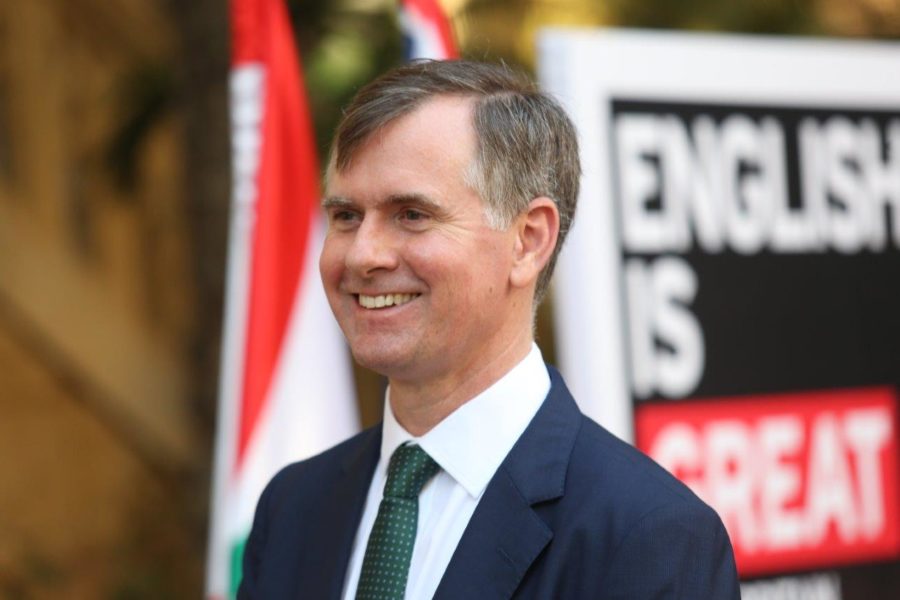2nd December 2017 Beirut, Lebanon
Lebanon, The Message

This week I was invited to speak at a conference entitled: ‘From the State of Greater Lebanon to Lebanon the Message’ organised by Adyan Foundation. I was asked to share my thoughts about Lebanon; its place in the region; the past and the lessons we can take from it; and together how we can deal with Lebanon’s future challenges.
I cannot claim that as British Ambassador I have any more expertise than others on Lebanon. However I was kindly invited to speak and I have a personal interest in how societies use experiences from the past to shape their future.
I spoke about what Lebanon can tell us as a country small in size, but big in influence. A country whose people always amaze me with their talent and energy. A country that, despite challenges, has risen from the devastation of war to become a beacon of resilience and inter-faith co-existence. A country that all Lebanese can rightly be proud of.
But I also spoke about a country whose stability and security has suffered from a neighbourhood that has not always been kind to it, to say the least. A country that has been, and continues to be, dragged into regional conflicts by internal and external actors. Often against its best interests, and the wishes of most of its people.
I hope, as a friend of Lebanon, you’ll allow me to do what good friends do – particularly, I’ve noticed, in Lebanon! That is, do some straight talking. I’m sure some will also accuse me of being over-optimistic, even unrealistic. But I have faith in Lebanon and its people. So, here are my three key lessons from Lebanon’s history. Lessons which I think can help this remarkable country deal with its future challenges.
1: the disassociation of Lebanon from regional conflicts is a necessity.
2: to succeed Lebanon requires a strong state.
3: any Government of Lebanon must legitimately represent all of its people.
On the first point – disassociation; Lebanese friends and colleagues often tell me a defining feature of the civil war was regional powers playing the Lebanese off against each other. Friends, neighbours, even family.
They often remark that Lebanon’s stability and security remains vulnerable to the goals and actions of external powers.
I agree. This is why, for me, disassociation is critical. To me disassociation means the Lebanese, and their leaders, putting Lebanon – its sovereignty and its people – before all else. It means working for Lebanon’s interests alone.
It also means challenging those who say fighting in regional wars outside of Lebanon – including in Yemen and Syria – is to Lebanon’s benefit. And asking if, on the contrary, this risks bringing instability, even conflict to Lebanon. Whether this is forcing Lebanon to compromise its best interests to suit the goals of others.
However disassociation doesn’t mean Lebanon can’t have a voice in the region. It means Lebanon has its own voice and opinion, not another country’s.
My second point is that a strong and sovereign state, able to provide security to its own people, is crucial. The civil war witnessed prolonged periods where the rule of law was the rule of the gun and the militia. Where external forces decided whether there was stability in Lebanon, not the Lebanese themselves. Lebanon has come a long way since then. The country’s army stands with the best in the region. It is an institution that represents the whole of Lebanon, and the best of Lebanon.
The UK is proud to be a long standing partner to the army and to Lebanon’s security services, as the sole legitimate providers of security and stability in Lebanon.
Lebanese history shows that it is risky to devolve this role away from Lebanon’s legitimate security institutions. It cannot be franchised out to other countries, or to unaccountable non-state actors.
Anything else drains power from the state and from its institutions. It weakens Lebanon as a whole. It leaves your security and Lebanon’s stability in the hands of others who have their own aims, or who represent the aims of outside powers.
My final point is that any Lebanese government must be answerable to the Lebanese people as a whole. Lebanese history demonstrates what happens when a government is seen only to represent a narrow set of interests.
Only a representative government can be legitimate, and only a legitimate government – one which is able to make decisions on behalf of all the Lebanese people – can guarantee Lebanese security and promote its sovereignty. Representative governments need to be based on strong democratic institutions.
I have faith that Lebanese politicians will demonstrate that Lebanon is again a leading democracy in the Middle East and ensure no further delays to Parliamentary elections.
To my Lebanese friends I also say that change remains in your hands. This includes electing new candidates which reflect Lebanon’s diversity – including women.
We remain committed to Lebanon as a message of tolerance, coexistence and democracy. We want you to succeed, and as long as you strive, we will be with you.
To finish – I believe in Lebanon the message. I also believe in Lebanon’s future.
A Lebanon with a strong policy of dissociation; free from external interference; a sovereign state reliant on itself for stability and security.
A Lebanon empowered by a representative government to make its own decisions, in the interests of its own people.
The English version was first published in the Daily Star Lebanon.